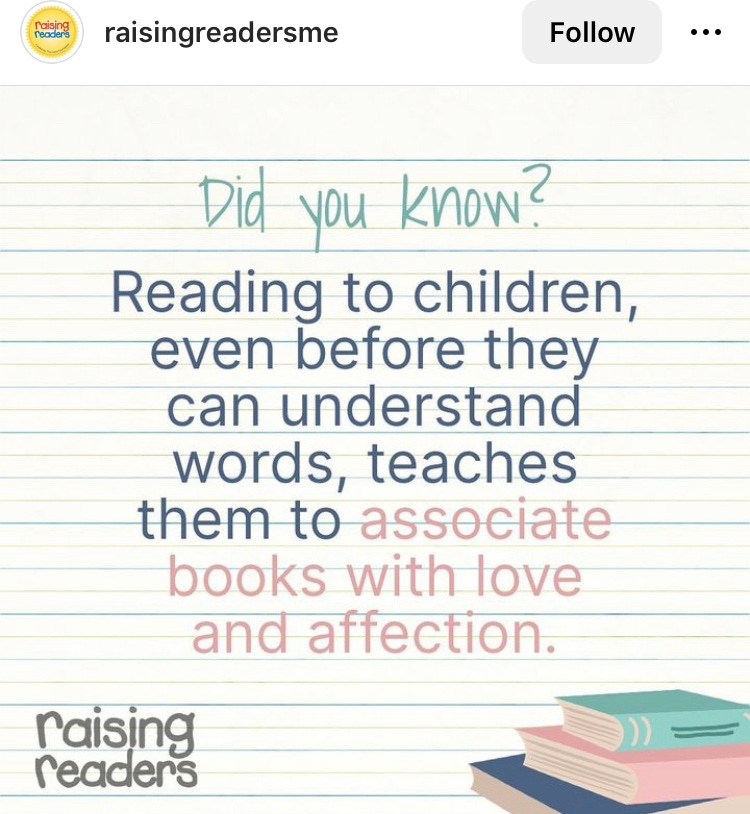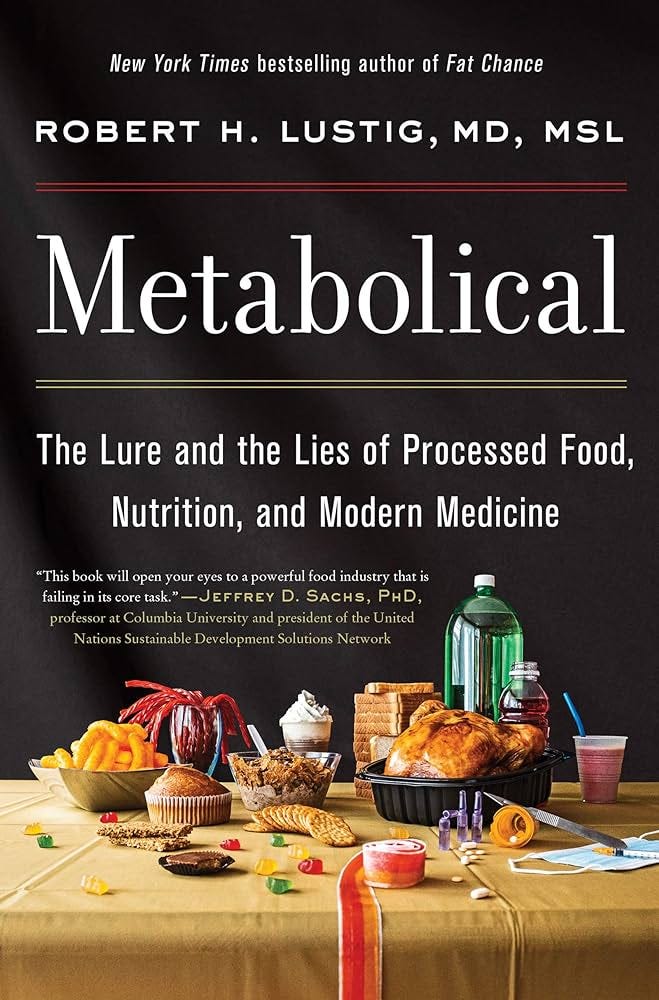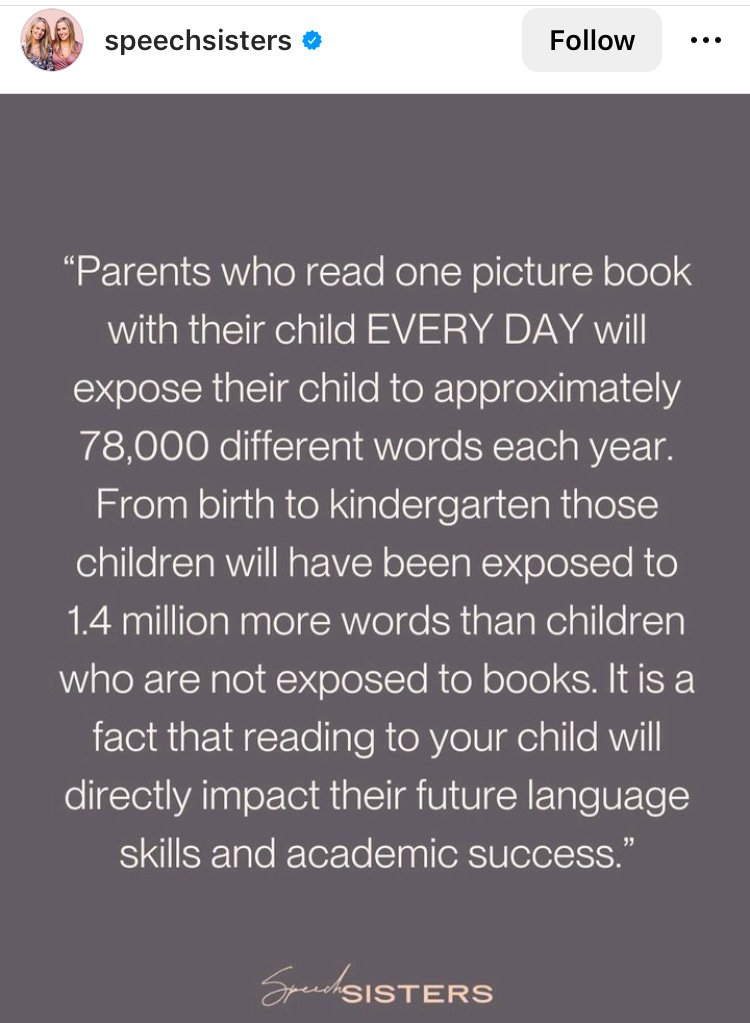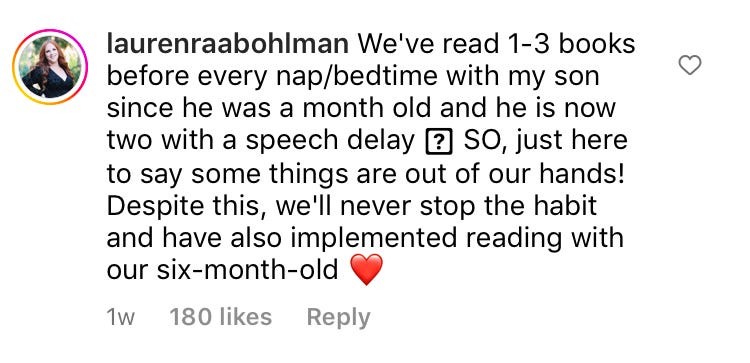Why Reading to Babies and Toddlers is Overrated
Reading is great, but it's not the best way to nurture your child's language development
Over the past few weeks, my 2.5-year-old’s language skills have been exploding. Her sentences are getting noticeably longer and more complex, the grammar more advanced and accurate. She’s joking around and hamming it up more, she’s more expressive and infusing her words with more attitude.
I haven’t been reading to her more—actually, I’ve barely read to her in a couple of months. We haven’t socialized much more than we usually do, and I don’t think we’re talking or singing to her more—again, probably a little less. Perhaps the “Tonie” box we recently bought deserves some credit, but her vocabulary has expanded well beyond reciting lyrics and dialogue from Encanto and Frozen.
So what are we doing differently? Well, about three weeks ago the eccentric hippy at our local health food store talked me into buying a pack of Mango-flavoured Bio-K probiotic yogurts.

I got them for myself; I’m pregnant again and was slowly recovering from the flu, and the store owner promised me I’d feel better the next day if I chugged one before bed (she wasn’t wrong). But my toddler saw me drinking one, and, naturally, demanded to try it.
She was instantly hooked. She asks for “medicine yogurt” multiple times per day; sometimes it’s the first thing she asks for in the morning. I like how they taste and make me feel too, and so we’ve split one almost every day for the past three weeks.
And over the same period, she went from speaking 5-6 word sentences to occasionally busting out 8-9 word sentences—going up to 12 words— including sentences that would require a comma if written down. (E.g. “I want to put my sweater, my shoes, and my socks on.”)
It could be a coincidence, of course. Kids don’t develop at a steady pace, but in leaps and bursts. But at the same time, it’s not unreasonable to suspect that the billions of healthy bacteria she’s been spooning into her mouth each day for the past three weeks might have given her brain a bit of a boost.
Reading is Overrated When It Comes to Baby/Toddler Language Development
Since becoming a mother, my social media feeds have bombarded me with childrearing advice. Here’s an Instagram post I saw last week:
I was amused. 78,000 different words each year from 365 picture books? Picture books typically have between 50-1,000 words, and there’s often a lot of repetition. A lot of the same words appear in different books. Naturally, I looked up the study.
The authors used the groundbreaking methodology of tallying the total number of words in 60 common books, adding them all together, dividing by 60, and multiplying by 365. Voila, 78,000 words. Not 78,000 different words. I’ve read my fair share of children’s books and I’m about 99.9% certain there’s some overlap there.
The second claim in the post is also incorrect. 78,000 word x 5 years is 390,000 words, not 1.4 million, and the study actually claims children who are read an average of 5 books per day are exposed to 1.4 million more words than if they were not read to. Which is also a bizarre claim; I guess the authors of the study (and the Instagram post) assume that those of us who don’t prioritize reading books to our toddlers are just sitting in silence with them instead. Certainly not talking in front of them, talking to them, playing music and singing, taking them out of the house to socialize with other children, or anything like that. If I offer to read her a book and she says “no”, I never suggest we do a puzzle or anything like that, we just sit on the couch in dead silence for twenty minutes. When I don’t read her a bedtime story, I just lie there quietly next to her (we bed-share), never talking or singing her songs or anything.

Bear with me—I have nothing against reading to toddlers, especially if they enjoy it and ask you to read to them. I pretty much always agree to read to my daughter when she requests it, even if it means reading I Love You Through and Through a dozen times in one day or singing “The Twelve Days of Christmas” until my throat is sore. I admit I don’t really see the point in reading to babies—especially before they can see the books properly—but it’s probably not going to harm them so whatever.


Snuggling up with a good book can be a fun way to bond, but I’m not convinced that reading to small children is the best way—or even a particularly good way—to develop their language and communication skills.
Here’s the top comment from the Speech Sisters “78,000 words” Instagram post:
Many other parents chimed in to say they read daily, and their kids still had speech or language delays. Others said that their kids were late talkers, but have since caught up and are now above average. Many parents pointed out that their kids request the same book every night and so aren’t exactly getting exposed to a variety of words. Others shared that their babies just try to eat the books and aren’t interested in reading.
As the one commenter points out, “Each child is different.” Please keep that in mind for the rest of this essay.
I didn’t read to my daughter until she was about six or seven months old and started showing an interest in books. Since then, reading has been inconsistent, depending on her mood and interest level, the weather, whether there’s something more fun to do, et cetera. We were reading every day for a while, but then she got really into puzzles and colouring and watching “Caitie’s Classroom” on YouTube so now we do more of that when we’re home.
And yet … my daughter said her first word (“Hi!”) around four months, well before we ever picked up a book with her. She spoke her first 3-4 word sentences before she was one, and now at just over two-and-a-half she seems to have a grasp of sentence composition and grammar that is more typical of a four-year-old, and a vocabulary of well over 1,000 words.
Here’s the thing: I never noticed a significant leap in her language skills associated with any of the periods where we read to her more. Actually, some of her biggest language leaps have occurred during periods of low reading, such as the last three weeks. I honestly don’t think children’s books have made a significant impact on her language development, at least not compared to other strategies we’ve focussed on: talking to her, talking in front of her, singing and playing music (both live and recorded), bed-sharing (singing songs to her and talking to her and to each other as she falls asleep), and baby-wearing (babies get more interaction opportunities when strapped to your chest than in a stroller). I’m 95% sure my daughter’s language skills have benefitted far more from us allowing her a later and more flexible bedtime (between 8:30pm-10:30pm) so she can attend social events with us than from the stack of wonderful picture books we own. (She still gets her 11-12 hours of sleep per night, she just sleeps in).
From a brain development stance, this makes a lot of sense. To give a simplistic overview: from birth until ages 3 or 4, the right hemisphere (RH) of children’s brains is rapidly growing and dominant, and the RH is the primary processor of non-verbal communication (e.g. body language, tone of voice, facial expressions) and music, as well as what can loosely be described as social-emotional skills, our relationships to living things and our own bodies. The left hemisphere, which starts to take over more around age four, is more mechanistic and is dominant in processing our relationships to non-living things. Reading is one of the more lateralized tasks in the human brain, and it lateralizes to the left side.
In other words, for the first few years of life, singing to and interacting to your child face-to-face is probably going to do a lot more for their language development—and brain development more generally—than reading (yes, I know lots of books have songs and rhymes in them! Those are great!).
Our plan is to focus more on reading as she approaches four years old—but, as a mother, I’m always going to prioritize stuff like socializing, music and singing together, and going out for some exercise in nature over books. I spent too much time reading when I was a kid, and have since come to believe that this was unhealthy. I know a lot of heavy readers, occasional readers, and rare-readers; the occasional and rare-readers have significantly better mental, physical, and social health than the heavy readers, and the occasional readers, on average, have more successful careers.
Everything in moderation.
The Dangers of Reading Too Much (Part 1)
Does excessive reading exacerbate autism and other psychiatric diagnoses?
“Neither Christ nor Buddha nor Socrates wrote a book, for to do so is to exchange life for a logical process.” —William Butler Yeats
Brain Development Depends Largely on the Gut
As tempted as I am to credit my toddler’s excellent communication skills entirely to our attachment-style and high-socialization approach to parenting, I believe the ways we nurture our children’s “second brains”—that is, their guts—are just as important as the ways we nurture their minds.
Because you know what? Over the past three weeks, pregnant and Substack-addled, I have hardly been at the top of my Mom game. And the couple weeks before that, when I had the flu, were even worse. And yet, my daughter just had what is probably her most significant and noticeable leap in language development to date. And I’m pretty darn sure it’s because of the probiotic yogurts.
I really only have a superficial understanding of the brain-gut connection, most of which I gleaned from books like Metabolical (Dr. Robert Lustig) or from my incredible binge-healing adventure with magic mushrooms back in 2020.
But I felt like I had to bring this up, especially in light of the arguments in my previous articles about the potential role of parenting and child-rearing factors in the development of mental illnesses and disorders such as autism and ADHD.
Bad parents are nothing new. Absent parents are nothing new. “Poisonous pedagogies” in parenting books go back at least four hundred years. Evil crap in schools? Nothing new. Bad therapy? Also nothing new. Toxic psychiatry? As old as the profession itself. Trauma? As old as humanity.
So why have the rates of mental distress been skyrocketing for the past century? Why are the rates of chronic illness climbing? Why are children less resilient? Why is average school performance declining? Why are more children getting diagnosed with developmental disorders and learning disabilities? Look, I have no doubt that factors like smartphones, social media, early daycare use, rising social isolation, lack of time with extended family, and the stuff I mentioned above are all huge players here. But I also suspect the biggest issues originate not in our social, familial, and educational environments, but in our gut microbiomes.
It’s insanely hard to nurture the gut microbiome. Healthy food is expensive. And even if you can afford healthy food, like my family can, there’s so much bad information, corporate propaganda, and media (and influencer) corruption out there, it’s basically impossible to wade through it and make good decisions 100% of the time (and, of course, some people are informed and make bad decisions anyway; I’m guilty of this!). Women in particular are hit with horrendous advice from the purveyors of both “diet” culture AND “body positivity” culture.
And even if you do have the cash and knowledge to make the healthiest decisions possible when it comes to food, there’s a ton of other factors that can deplete nutrient levels, disrupt the gut microbiome, and cause dysbiosis.
We’re being poisoned by pollution, pesticides, pharmaceuticals, and processed foods.
There are a lot of parents out there who are doing a great job of feeding their children’s brains. But if there’s a problem with the gut microbiome, those kids aren’t going to be able to properly digest the brain-food either.

I thought I was doing a great job of nurturing my daughter’s brain-gut through the microbiome. We limit highly processed foods, refined sugars, and seed oils. Petroleum-based food dyes are completely banned. I’ve never given her Tylenol and treat her (infrequent) illnesses with teas, spices, and essential oils. We try to give her a healthy, a balanced diet. I give her cod liver oil every day and we try to enjoy nature and the sun as much as possible. (Etc etc etc).
But oh man did we see a change with those probiotic yogurts. And I’ve talked to a few friends about this, women who make their own probiotic yogurts and kefir and asked me if I ever give my daughter kimchi (errr … no, I haven’t) and I’ve since learned that we could have been doing a lot better in this department.
As I said, it could be a coincidence. But I’m going to keep buying those probiotic yogurts and sharing them with my daughter; at least until I follow up with one of the friends who have offered to teach me how to make my own!
Food for thought.
Note: I don’t work for Bio-K+ and I have no idea if theirs is the best probiotic option on the market. I also realize that probiotics affect everyone differently and sometimes they can make gut issues worse (I’m not sure how this works!). The takeaway from this story should be “my daughter went from no probiotic supplements to taking a super-strong yogurt one and we immediately saw cognitive benefits” not “Buy Bio-K+!”. My husband and I have both taken probiotics in pill form before this, but now both like the yogurts better, and I’ve noticed a boost in my energy and mental clarity since making the switch. I never experienced noticeable benefits with any of the pill-form probiotics I’ve tried. Anyway, I don’t know. Yogurt nerds, feel free to drop a comment!
Also it bears repeating that if your toddlers want you to read to them, you should read to them. I’m not saying reading is bad, I’m just saying that there are more important ways to develop their brains. Reading can be great for the brain, though I’d argue it really, really depends on the contents of the book. When it comes to books there’s a bit of a garbage in garbage out problem. Anyway, this post is long enough, I’m sorry for making you read so much in a post about how reading is overrated.





P.S. I agree that reading isn't it, it's the storytelling if anything that matters.
Possibly gut health, certainly possible but in my experience as a parent and from years of working with kids here is my take. Children's (generalized of course - exceptions exist) language improves faster with use, Toddlers with lots of exposure to conversations with adults (not talking over them tho) is huge. The next most important is those interactions with other children/adults while cultivating curiosity and imagination. Small children instinctively want to share with you what they are thinking/ doing and they need language for that. The more curiosity and imagination they have the faster the language will develop. Simply put I think children that have something to say will learn to say it sooner and more eloquently. Children that only need language to convey immediate needs/wants will use it less, not as quickly and with no need for an expansive vocabulary.